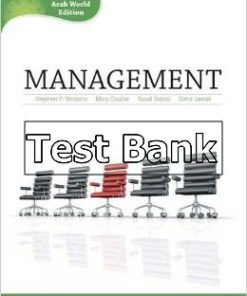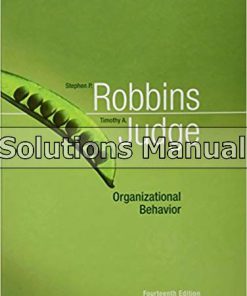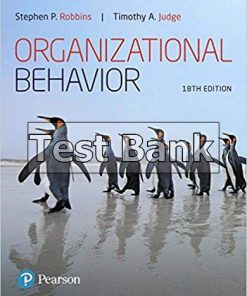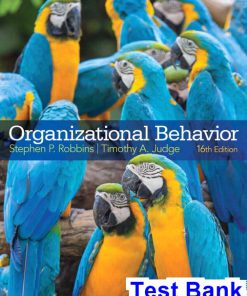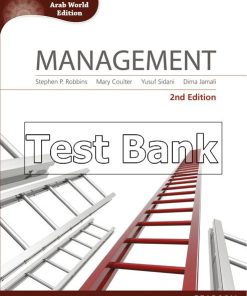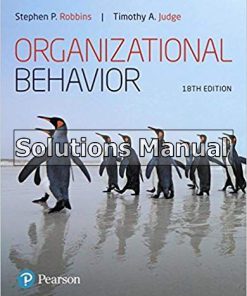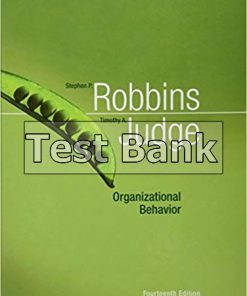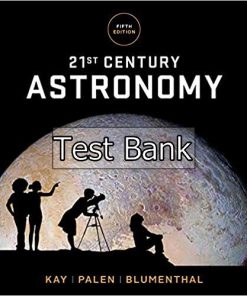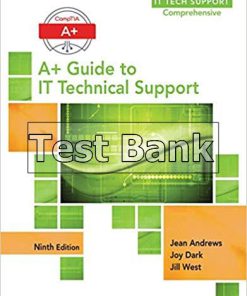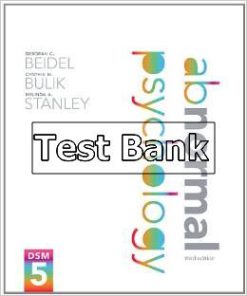Organizational Behavior Arab World Edition 1st Edition Robbins Test Bank
$50.00 Original price was: $50.00.$26.50Current price is: $26.50.
Organizational Behavior Arab World Edition 1st Edition Robbins Test Bank.
Organizational Behavior Arab World Edition 1st Edition Robbins Test Bank
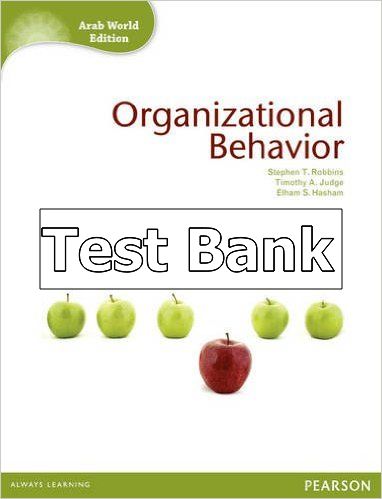
Product details:
- ISBN-10 : 1408259656
- ISBN-13 : 978-1408259658
- Author: Stephen P. Robbins; Timothy A. Judge; ELHAM S. HASHAM
Providing both undergraduate and postgraduate students with the research and information they need to succeed in their organizational behaviour studies, this text has also been adapted to meet the specific learning needs of students in the Arab region. This text covers key aspects of the discipline in a language, style and methodology readers can engage with, and includes references to well known Arab companies and local case studies so students can better relate to the book’s theory
Table contents:
- 1 Introduction
- 1 What Is Organizational Behavior?
- The Importance of Interpersonal Skills
- What Managers Do
- Management Functions
- Management Roles
- Management Skills
- Effective Versus Successful Managerial Activities
- A Review of the Manager’s Job
- This Is Organizational Behavior
- Complementing Intuition with Systematic Study
- Disciplines That Contribute to OB
- Psychology
- Social Psychology
- Sociology
- Anthropology
- There Are Few Absolutes in OB
- Challenges and Opportunities for OB
- The Significance of Globalization
- Managing Workforce Diversity
- Improving Quality and Productivity
- Improving Customer Service
- Improving People Skills
- Stimulating Innovation and Change
- Helping Employees Balance Work–Life Conflicts
- Creating a Positive Work Environment
- Improving Ethical Behavior
- Developing an OB Model
- An Overview
- The Dependent Variables
- The Independent Variables
- Toward a Contingency OB Model
- Global Implications
- Summary and Implications for Managers
- Self-Assessment Library How Much Do I Know About Organizational Behavior?
- OB in the News Other Disciplines Make Use of OB Concepts
- International OB Organizational Citizenship at Byblos Bank
- Point/Counterpoint In Search of the Quick Fix
- Questions for Review
- Discussion Exercise A Day in the Life of Hussam
- Ethical Considerations
- Critical Analysis Equal Opportunity at Crepaway
- Research Exercise
- 2 The Individual
- 2 Foundations of Individual Behavior: Personality and Values
- Ability
- Intellectual Abilities
- Physical Abilities
- Biographical Characteristics
- Age
- Gender
- Race
- Tenure
- Learning
- A Definition of Learning
- Theories of Learning
- Shaping: A Managerial Tool
- Personality
- What Is Personality?
- Measuring Personality
- The Myers-Briggs Type Indicator
- The Big Five Personality Model
- Other Personality Traits Relevant to OB
- Values
- The Importance of Values
- The Relationship Between an Individual’s Personality and the Workplace
- Person–Job Fit
- Person–Organization Fit
- Linking Cultures and Behavior
- Hofstede’s Framework for Assessing Cultures
- The GLOBE Framework for Assessing Cultures
- Global Implications
- Intellectual Abilities
- Biographical Characteristics
- Learning
- Personality
- Values
- Summary and Implications for Managers
- Self-Assessment Library What’s My Attitude Toward Achievement?
- International OB Cultural Intelligence Is Necessary
- OB in the News Whatever Men Can Do, Women Can Also Do
- Self-Assessment Library How Good Am I at Disciplining Others?
- Point/Counterpoint All Human Behavior is Learned
- Questions for Review
- Discussion Exercise
- Ethical Considerations
- Critical Analysis Qatar: A Country with a Vision
- Research Exercise
- 3 Attitudes and Job Satisfaction
- Attitudes
- What Are the Main Components of Attitudes?
- Is There a Relationship Between Behavior and Attitudes?
- What Are the Major Job Attitudes?
- Job Satisfaction
- Measuring Job Satisfaction
- How Satisfied Are People in Their Jobs?
- What Causes Job Satisfaction?
- The Impact of Satisfied and Dissatisfied Employees on the Workplace
- Global Implications
- Is Job Satisfaction Specific to Cultures?
- Are Employees in Western Cultures More Satisfied with Their Jobs Than Those in the East?
- Summary and Implications for Managers
- Self-Assessment Library How Satisfied Am I With My Job?
- International OB Organizational Commitment at Aramex
- Self-Assessment Library Am I Engaged?
- OB in the News Job Satisfaction: Does It Differ Across Cultures?
- Point/Counterpoint Managers Can Create Satisfied Employees
- Questions for Review
- Discussion Exercise
- Ethical Considerations
- Critical Analysis Job Satisfaction in the UAE
- Research Exercise
- 4 Perception and Individual Decision Making
- What Is Perception?
- Factors That Influence Perception
- Person Perception: Making Judgments About Others
- Attribution Theory
- Frequently Used Shortcuts in Judging Others
- Specific Applications of Shortcuts in Organizations
- The Link Between Perception and Individual Decision Making
- Decision Making in Organizations
- The Rational Model, Bounded Rationality, and Intuition
- Common Biases and Errors in Decision Making
- Influences on Decision Making: Individual Differences and Organizational Constraints
- Individual Differences
- Organizational Constraints
- What About Ethics in Decision Making?
- Three Ethical Decision Criteria
- Improving Creativity in Decision Making
- Global Implications
- Summary and Implications for Managers
- Self-Assessment Library What’s My Attitude Toward Older People?
- International OB How Culture Influences Decision Making
- Self-Assessment Library Am I a Deliberate Decision Maker?
- OB in the News inJAz Bahrain’s Business Ethics Program
- Self-Assessment Library How Creative Am I?
- Point/Counterpoint When In Doubt, Do!
- Questions for Review
- Discussion Exercise
- Ethical Considerations
- Critical Analysis Decision Making Processes at Steel Inc
- Research Exercise
- 5 Motivation: Concepts and Applications
- Defining Motivation
- Early Theories of Motivation
- Hierarchy of Needs Theory
- Theory X and Theory Y
- Two-Factor Theory
- McClelland’s Theory of Needs
- Contemporary Theories of Motivation
- Cognitive Evaluation Theory
- Goal-Setting Theory
- Self-Efficacy Theory
- Reinforcement Theory
- Equity Theory
- Expectancy Theory
- Motivating by Job Design: The Job Characteristics Model
- The Job Characteristics Model
- How Can Jobs Be Redesigned?
- Alternative Work Arrangements
- Employee Involvement
- Examples of Employee Involvement Programs
- Linking Employee Involvement Programs and Motivation Theories
- Using Rewards to Motivate Employees
- What to Pay: Establishing a Pay Structure
- How to Pay: Rewarding Individual Employees through Variable-Pay Programs
- Flexible Benefits: Developing a Benefits Package
- Intrinsic Rewards: Employee Recognition Programs
- Global Implications
- Summary and Implications for Managers
- Self-Assessment Library How Confident Am I in My Abilities to Succeed?
- International OB Motivation and Culture: What’s the Relationship?
- Self-Assessment Library What Are My Course Performance Goals?
- OB in the News What Motivates Employees?
- Self-Assessment Library What’s My Job’s Motivating Potential?
- Point/Counterpoint Praise Motivates
- Questions for Review
- Discussion Exercise
- Ethical Considerations
- Critical Analysis Reducing Travel Costs at Applebee’s
- Research Exercise
- 6 Emotions and Moods
- What Are Emotions and Moods?
- The Basic Emotions
- The Basic Moods: Positive and Negative Affect
- The Function of Emotions
- Sources of Emotions and Moods
- Emotional Labor
- Affective Events Theory
- Emotional Intelligence
- The Case for EI
- The Case Against EI
- OB Applications of Emotions and Moods
- Selection
- Decision Making
- Creativity
- Motivation
- Leadership
- Negotiation
- Customer Service
- Job Attitudes
- Deviant Workplace Behaviors
- How Managers Can Influence Moods
- Global Implications
- Does the Degree to Which People Experience Emotions Vary Across Cultures?
- Do Peoples’ Interpretations of Emotions Vary Across Cultures?
- Do the Norms for the Expression of Emotions Differ Across Cultures?
- Summary and Implications for Managers
- Self-Assessment Library How Are You Feeling Right Now?
- Self-Assessment Library What’s My Affect Intensity?
- International OB Emotional Recognition: Universal or Culture Specific?
- Self-Assessment Library What’s My Emotional Intelligence Score?
- OB in the News Crying at Work Gains Acceptance
- Point/Counterpoint The Costs and Benefits of Organizational Display Rules
- Questions for Review
- Discussion Exercise
- Ethical Considerations
- Critical Analysis Happiness: Just an Emotion!
- Research Exercise
- 3 The Group
- 7 Foundations of Group Behavior
- Defining and Classifying Groups
- Stages of Group Development
- The Five-Stage Model
- An Alternative Model for Temporary Groups with Deadlines
- Group Properties: Roles, Norms, Status, Size, and Cohesiveness
- Group Property 1: Roles
- Group Properties 2 and 3: Norms and Status
- Group Property 4: Size
- Group Property 5: Cohesiveness
- Group Decision Making
- Groups versus the Individual
- Groupthink and Groupshift
- Group Decision Making Techniques
- Global Implications
- Summary and Implications for Managers
- Self-Assessment Library What’s My Attitude Toward Working in Groups?
- Self-Assessment Library Do I Trust Others?
- International OB Group Cohesiveness Across Cultures
- OB in the News Groupthink for an Enron Jury?
- Point/Counterpoint Are Groups the Best Design?
- Questions for Review
- Discussion Exercise
- Ethical Considerations
- Critical Analysis If Two Heads Are Better than One, Are Four Even Better?
- Research Exercise
- 8 Understanding Work Teams
- Why Have Teams Become So Popular?
- Differences between Groups and Teams
- Types of Teams
- Problem-Solving Teams
- Self-Managed Work Teams
- Cross-Functional Teams
- Virtual Teams
- Creating Effective Teams
- Context: What Factors Determine whether Teams Are Successful
- Team Composition
- Work Design
- Team Processes
- Turning Individuals into Team Players
- Beware! Teams Aren’t Always the Answer
- Global Implications
- Summary and Implications for Managers
- Self-Assessment Library How Good Am I at Building and Leading a Team?
- International OB Global Virtual Teams
- OB in the News Surgical Teams Lack Teamwork
- Self-Assessment Library What Is My Team Efficacy?
- Point/Counterpoint Sports Teams Are Good Models for Workplace Teams
- Questions for Review
- Discussion Exercise
- Ethical Considerations
- Critical Analysis Team Effectiveness in Egypt
- Research Exercise
- 9 Communication
- Functions of Communication
- The Communication Process
- Direction of Communication
- Downward Communication
- Upward Communication
- Lateral Communication
- Interpersonal Communication
- Oral Communication
- Written Communication
- Nonverbal Communication
- Organizational Communication
- Formal Small-Group Networks
- The Grapevine
- Electronic Communications
- Knowledge Management
- Choice of Communication Channel
- Barriers to Effective Communication
- Filtering
- Selective Perception
- Information Overload
- Emotions
- Language
- Communication Apprehension
- Gender Differences
- ‘Politically Correct’ Communication
- Global Implications
- Cultural Barriers
- Cultural Context
- A Cultural Guide
- Summary and Implications for Managers
- Self-Assessment Library What’s My Face-to-Face Communication Style?
- International OB Cultural Differences in Oral Communication
- OB in the News Communication in the Arab World
- International OB Lost in Translation?
- Self-Assessment Library How Good Are My Listening Skills?
- Point/Counterpoint Keep It a Secret
- Questions for Review
- Discussion Exercise
- Ethical Considerations
- Critical Analysis The Limitations of Electronic Communication
- Research Exercise
- 10 Leadership
- What Is Leadership?
- Trait Theories
- Behavioral Theories
- Ohio State Studies
- University of Michigan Studies
- Summary of Trait Theories and Behavioral Theories
- Contingency Theories: Fiedler Model and Situational Leadership Theory
- Fiedler Model
- Hersey and Blanchard’s Situational Theory
- Path-Goal Theory
- Path-Goal Variables and Predictions
- Summary of Contingency Theories
- Leader–Member Exchange (LMX) Theory
- Decision Theory: Vroom and Yetton’s Leader-Participation Model
- Inspirational Approaches to Leadership
- Charismatic Leadership
- Transformational Leadership
- Authentic Leadership: Ethics and Trust Are the Foundation of Leadership
- What Is Authentic Leadership?
- Ethics in Leadership and Corporate Social Responsibility
- What Is Trust?
- Trust and Leadership
- Three Types of Trust
- Basic Principles of Trust
- Contemporary Leadership Roles
- Mentoring
- Self-Leadership
- Online Leadership
- Challenges to the Leadership Construct
- Leadership as an Attribution
- Substitutes for and Neutralizers of Leadership
- Finding and Creating Effective Leaders
- Selecting Leaders
- Training Leaders
- Global Implications
- Summary and Implications for Managers
- Self-Assessment Library What’s My Leadership Style?
- OB in the News Riding the Waves Requires Leadership Skill!
- Self-Assessment Library What Is My LPC Score?
- Self-Assessment Library How Charismatic Am I?
- Self-Assessment Library Am I an Ethical Leader?
- International OB Cultural Variation in Charismatic Attributions
- Point/Counterpoint Leaders Are Born, Not Made
- Questions for Review
- Discussion Exercise
- Ethical Considerations
- Critical Analysis Cultural Variation in Charismatic Attributions
- Research Exercise
- 11 Power and Politics
- A Definition of Power
- Contrasting Leadership and Power
- Bases of Power
- Formal Power
- Personal Power
- Which Bases of Power Are Most Effective?
- Dependency: The Key to Power
- What Creates Dependency?
- Power Tactics
- Sexual Harassment: Unequal Power in the Workplace
- Politics: Power in Action
- Definition of Organizational Politics
- The Reality of Politics
- Causes and Consequences of Political Behavior
- Factors Contributing to Political Behavior
- How Do People Respond to Organizational Politics?
- Impression Management
- The Ethics of Behaving Politically
- Global Implications
- Politics Perceptions
- Preference for Power Tactics
- Effectiveness of Power Tactics
- Summary and Implications for Managers
- Self-Assessment Library Is My Workplace Political?
- International OB Influence Tactics in China
- Self-Assessment Library How Good Am I at Playing Politics?
- OB in the News Excuses Are Everywhere
- Point/Counterpoint Managing Impressions Is Unethical
- Questions for Review
- Discussion Exercise
- Ethical Considerations
- Critical Analysis The Politics of Backstabbing
- Research Exercise
- 12 Conflict and Negotiation
- A Definition of Conflict
- Transitions in Conflict Thought
- The Traditional View of Conflict
- The Human Relations View of Conflict
- The Interactionist View of Conflict
- The Conflict Process
- Stage I: Potential Opposition or Incompatibility
- Stage II: Cognition and Personalization
- Stage III: Intentions
- Stage IV: Behavior
- Stage V: Outcomes
- Negotiation
- Bargaining Strategies
- The Negotiation Process
- Individual Differences in Negotiation Effectiveness
- Third-Party Negotiations
- Global Implications
- Conflict and Culture
- Cultural Differences in Negotiations
- Summary and Implications for Managers
- Self-Assessment Library What’s My Preferred Conflict-Handling Style?
- Self-Assessment Library What’s My Negotiating Style?
- International OB Negotiating Across Cultures
- OB in the News ‘Marriage Counseling’ for the Top Bosses
- Point/Counterpoint Conflict Benefits Organizations
- Questions for Review
- Discussion Exercise
- Ethical Considerations
- Critical Analysis Etisalat-Zain Deal Blocked
- Research Exercise
- 4 The Organization System
- 13 Foundations of Organizational Structure
- What Is Organizational Structure?
- Work Specialization
- Departmentalization
- Chain of Command
- Span of Control
- Centralization and Decentralization
- Formalization
- Common Organizational Designs
- The Simple Structure
- The Bureaucracy
- The Matrix Structure
- New Design Options
- The Virtual Organization
- The Boundaryless Organization
- Why Do Structures Differ?
- Strategy
- Organization Size
- Technology
- Environment
- Organizational Designs and Employee Behavior
- Global Implications
- Summary and Implications for Managers
- Self-Assessment Library Do I Like Bureaucracy?
- Self-Assessment Library How Willing Am I to Delegate?
- OB in the News Siemens Simple Structure—Not
- International OB Structural Considerations in Multinationals
- Point/Counterpoint Downsizing Improves Organizational Performance
- Questions for Review
- Discussion Exercise
- Ethical Considerations
- Critical Analysis Organizational Structure at Food & Co
- Research Exercise
- 14 Organizational Culture
- Institutionalization: A Forerunner of Culture
- What Is Organizational Culture?
- A Definition of Organizational Culture
- Culture Is a Descriptive Term
- Do Organizations Have Uniform Cultures?
- Strong versus Weak Cultures
- Culture versus Formalization
- What Do Cultures Do?
- Culture’s Functions
- Culture as a Liability
- Creating and Sustaining Culture
- How a Culture Begins
- Keeping a Culture Alive
- Summary: How Cultures Form
- How Employees Learn Culture
- Stories
- Rituals
- Material Symbols
- Language
- Creating an Ethical Organizational Culture
- Creating a Positive Organizational Culture
- Spirituality and Organizational Culture
- What Is Spirituality?
- Why Spirituality Now?
- Characteristics of a Spiritual Organization
- Criticisms of Spirituality
- Global Implications
- Summary and Implications for Managers
- Self-Assessment Library What’s the Right Organizational Culture for Me?
- International OB Managing Across Organizational Boundaries
- OB in the News Change Jobs, and You May Be in for a Culture Shock
- Self-Assessment Library How Spiritual Am I?
- Point/Counterpoint Organizational Cultures Can’t Be Changed
- Questions for Review
- Discussion Exercise
- Ethical Considerations
- Critical Analysis Ghosn Turns Nissan Around
- Research Exercise
- 15 Human Resource Policies and Practices in the Arab World
- Human Resource Management Societies
- The Recruitment Process
- Selection Practices
- How the Selection Process Works
- Initial Selection
- Substantive Selection
- Contingent Selection
- Training and Development Programs
- Types of Training
- Training Methods
- Individualizing Formal Training to Fit the Employee’s Learning Style
- Evaluating Effectiveness of Training Programs
- Performance Evaluation
- Purposes of Performance Evaluation
- What Do We Evaluate?
- Who Should Do the Evaluating?
- Methods of Performance Evaluation
- Providing Performance Feedback
- Suggestions for Improving Performance Evaluations
- Managing Diversity in Organizations
- Work–Life Conflicts
- Diversity Training
- Global Implications
- Selection
- Performance Evaluation
- Summary and Implications for Managers
- Self-Assessment Library How Much Do I Know About HRM?
- International OB Cultural Training
- OB in the News Awareness of Human Capital From Within: ‘Project Emiratization’
- Self-Assessment Library How Good Am I at Giving Performance Feedback?
- Point/Counterpoint Telecommuting Makes Good Business Sense
- Questions for Review
- Discussion Exercise
- Ethical Considerations
- Critical Analysis So7i Wa Sari3
- Research Exercise
- 5 Organization Dynamics
- 16 Organizational Change and Stress Management
- Forces for Change
- Planned Change
- Resistance to change
- Overcoming Resistance to Change
- The Politics of Change
- Approaches to Managing Organizational Change
- Lewin’s Three-Step Model
- Kotter’s Eight-Step Plan for Implementing Change
- Action Research
- Organizational Development
- Creating a Culture for Change
- Stimulating a Culture of Innovation
- Creating a Learning Organization
- Work Stress and Its Management
- What Is Stress?
- Potential Sources of Stress
- Individual Differences
- Emotional Intelligence and Stress
- Consequences of Stress
- Managing Stress
- Global Implications
- Summary and Implications for Managers
- Self-Assessment Library How Well Do I Respond to Turbulent Change?
- Self-Assessment Library How Stressful Is My Life?
- OB in the News The Ten Most Stressful Jobs—and One More That Didn’t Make the List
- International OB Coping with Stress: Cultural Differences
- Point/Counterpoint Managing Change is an Episodic Activity
- Questions for Review
- Discussion Exercise
- Ethical Considerations
- Critical Analysis Embracing Change Through Operational Leadership
- Research Exercise
- 17 Organizational Behavior in the Family Business
- What Is a Family Business?
- Definitions of the Family Business
- Statistics about the Family Business
- Planning the Family Business
- Organizational Structure of the Family Business
- The Characteristics of the Family Business
- Organizational Behavior in the Family Business
- Family Businesses Are Dominant in the Arab World
- The Family Business in the Arab World
- Advantages of the Family Business
- Disadvantages of the Family Business
- The Succession Plan
- How and When Should the Business Be Transferred?
- Family Business Continuity
- The Future of the Family Business
- Global Implications
- Summary and Implications for Managers
- Self-Assessment Library Am I Experiencing Work/Family Conflict?
- OB in the News The Family Business: The Foundation of Arab World Success
- International OB Globalization: The Direction of Arab Family Businesses
- Point/Counterpoint Is Structure Needed?
- Questions for Review
- Discussion Exercise
- Ethical Considerations
- Critical Analysis From London to Lebanon
- Research Exercise
- 6 Specifics in OB
- 18 Intercultural Management: The Significance to Organizational Behavior
- What Is Intercultural Management?
- Hofstede’s Cultural Dimensions
- Hofstede’s Dimensions and the Arab World
- Managing Diversity
- What Do Intercultural Managers Do?
- Intercultural Managers’ Competencies
- Cultural Awareness Framework
- The Intercultural Manager as a Problem Solver
- The Intercultural Manager as a Negotiator
- The Significance of Communication for the Intercultural Manager
- High versus Low Culture Contexts
- How to Enhance Communication
- The Intercultural Manager as Global Manager
- Corporate Culture
- Foreign Labour
- Domains of International Business Practice
- Cross-Cultural Training
- Global Implications
- Summary and Implications for Managers
- Self-Assessment Library Am I Well-Suited for a Career as a Global Manager?
- OB in the News Yahoo! Talks Arabic; Maktoob Talks English!
- International OB Intercultural Action at Hillcrest!
- Point/Counterpoint “When in Rome, Do as the Romans Do”
- Questions for Review
- Discussion Exercise
- Ethical Considerations
- Critical Analysis What’s Trust Got to Do with It?
- Research Exercise
- 19 Female Entrepreneurs in the Arab World
- The Need for Women in the Workplace
- Characteristics of Entrepreneurs
- Growth of Women-Owned Businesses in the Arab World
- The Role of Women in Business
- The Female Entrepreneur in the Arab World
- Motivation
- Successful Female Entrepreneurs
- The Barriers for Women in the Arab World
- Low Income
- Glass Ceiling
- Gender Discrimination
- Time Shifts
- Nepotism
- Other Challenges
- How Do Males React to Successful Females?
- Stereotypes Can Be Broken: Time for Change
- Global Implications
- Summary and Implications for Managers
- Self-Assessment Library What Are My Gender Role Perceptions?
- International OB The World Supports the Middle Eastern Woman
- OB in the News Female Leaders in Business
- Point/Counterpoint Females Can Find a Balance
- Questions for Review
- Discussion Exercise
- Ethical Considerations
- Critical Analysis No Matter What, the Boardroom Is Still Off Limits to Females!
- Research Exercise
- Appendix A: Research in Organizational Behavior
- Comprehensive Cases
- Case 1 Being Lean, Not Mean
- Case 2 She Loves a Challenge!
- Case 3 A New Way to Change
- Case 4 What a Strange Man!
- Case 5 A Question of Motivation
- Case 6 The Big Promotion
- Credits
- Endnotes
- Glossary
People also search:
organizational behavior 16th edition pdf
|
organizational behavior human behavior at work 14th edition
|
a history of arab peoples pdf
behavior in organizations (10th edition pdf free)
globalization and organizational behavior
m organizational behavior
Instant download after Payment is complete
You may also like…
Solutions Manual
Organizational Behavior 14th Edition Robbins Solutions Manual
Solutions Manual
Solutions Manual
Organizational Behavior 18th Edition Robbins Solutions Manual
Solutions Manual






